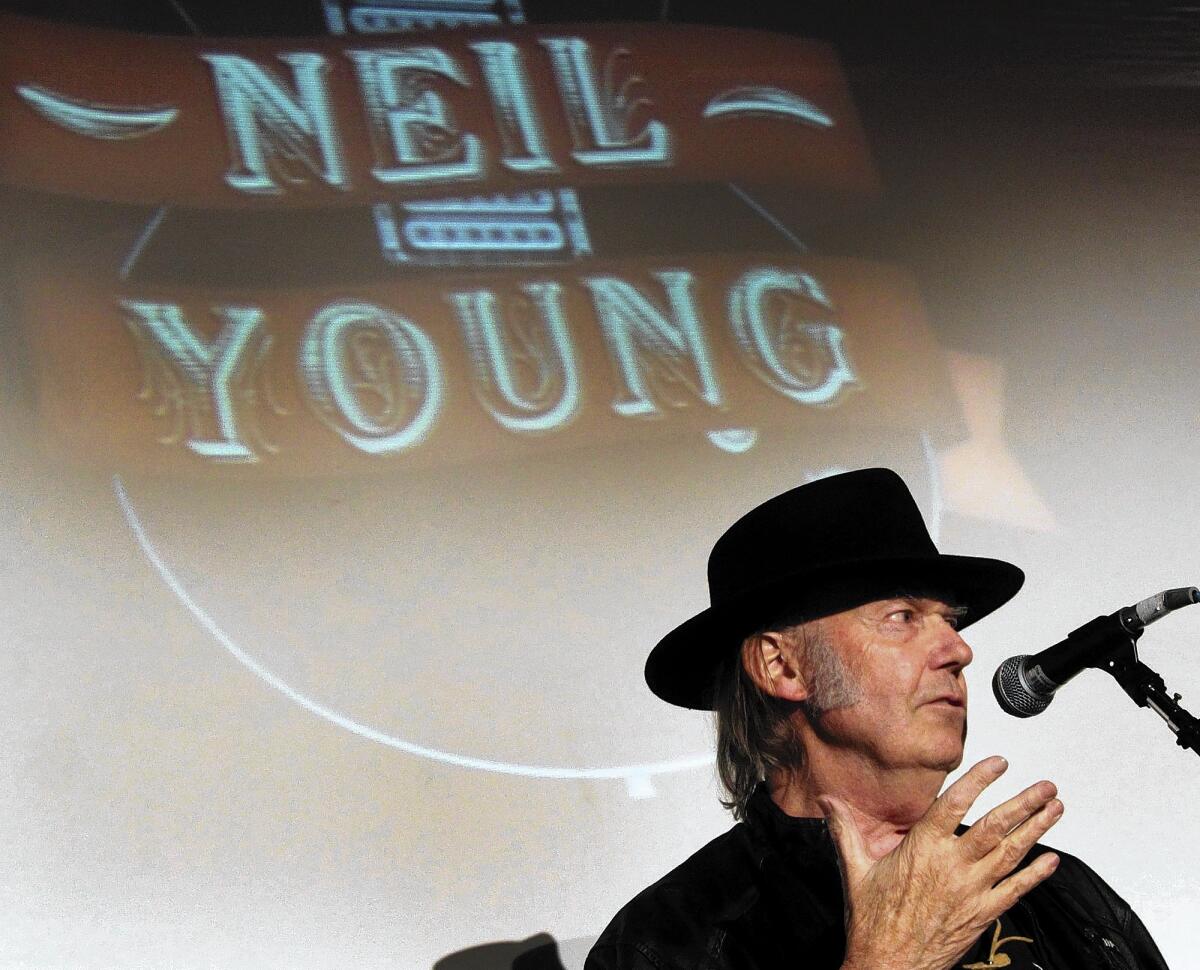Neil Young goes on the record at Grammy event

The annual bash thrown by the Grammy Producers & Engineers Wing at Village Recorders studio in West Los Angeles is typically one of the livelier Grammy week events, but this year, as if to ensure there would be not a whiff of stuffiness, they chose Neil Young as the recipient of this yearâs Presidentâs Merit Award.
Tuesdayâs gathering was dominated by producers and other recording studio personnel but also drew industry executives and musicians, including longtime friend and collaborator Stephen Stills, Kris Kristofferson and Jakob Dylan, among others. Additionally, Dave Matthews made a surprise appearance and sang three songs in tribute to Young, who did not perform.
Where most awards show acceptance speeches â those on television anyway â are quick-hit thank yous to a laundry list of names, Young used the occasion to talk at length about how and why he records, and how that process is integral to the fiercely individualistic music heâs been making for nearly 50 years.
TIMELINE: Grammy winners through the years
âThis is a cool night, because weâre all here together,â Young, 68, told the audience packed into the Villageâs biggest room on Tuesday. âIâm kind of a producer, partially an engineer [but] Iâm not really good at either one, as anyone whoâs heard my records can attest.
âIâm in a world where technical things donât matter that much,â he said. âBut thatâs only one way of making records. Thereâs a lot of you of out here who just craft some beautiful records and take great care with every note.
âI know Iâm not one of them,â he added with a smile.
Young, however, has historically gone to great lengths to make sure his records sound the way he wants them to, and often has caused record company executives considerable headaches with eleventh-hour fixes or changes to his music.
âI like to capture the moment,â he said. âThereâs a lot of compromises you make to get that feeling. But in the long run, thatâs where the pictures are when I hear my words. Thatâs what we try to record.â
He recalled using the Village studios in 1974 working on a track that would become one of the cornerstones of his extensive repertoire, âLike a Hurricane,â and gave the audience a play by play of how the song came together.
PHOTOS: Iconic rock guitars and their owners
Young explained that he recorded the instrumental track first on his home recording studio with his band, Crazy Horse, the day after heâd written it. At that time, he was under doctors orders not to sing because of recent surgery. âBut that didnât stop the music,â he said.
He decided to record the vocal later and took the tape to play back at the Village. âI was here at this place in 1974 or something. This is back when I couldnât sing.â
Pausing, he added, âBy the way, I know I canât sing,â causing an eruption of laughter. âBut at that time I couldnât make a sound.â
Eventually he added the vocal, urging the studio engineer to record everything from the moment he set foot in the studio, something that has long been standard practice for Young, though many engineers often wait to press âRecordâ until they set and adjust recording levels and prepare various pieces of equipment.
Young recalled instructing him, âRecord all the time. Thatâs why weâre here. Itâs a studio â record! Come on. Practice at home! The red buttonâs not that scary, itâs really not.â
More laughter followed, after which Young made his point.
âIt was the first time I was ever listening to âLike a Hurricaneâ and it was here in this building,â he said. âThereâs a message in there somewhere. My memory of this place is what it is: Itâs that you do records like that. The idea is for me is to try to get magic. Who knows where the hell it comes from? I donât. So please record.â
PHOTOS: Unexpected musical collaborations
He also put in a word for his Pono music system, which he aims to formally announce in March at the South By Southwest Music Conference in Austin. Itâs a playback system that will access audiophile-quality digital source material from all four major label groups and allow consumers to decide what resolution level they want to pay for. Currently, CDs contain about 20% of the digital information thatâs contained in master recordings, and mp3 files offer only 2% to 3% of what the artist originally heard in the studio.
âThe thing we do is we create great stuff in the studio, and then we kiss [it] goodbye,â he said. âIt didnât used to be that way. Thatâs something that happened to us, thatâs an injury we sustained and itâs deeply hurt us.
âSo the time has come for us to recover, and to bring music back to the people in a way that they can recognize it in their soul, through the window of their soul, so they can feel, and vibrate and so that they can get goosebumps,â Young said.
âWe cherish those goosebumps. Never lose those.â
Twitter: @RandyLewis2
More to Read
The biggest entertainment stories
Get our big stories about Hollywood, film, television, music, arts, culture and more right in your inbox as soon as they publish.
You may occasionally receive promotional content from the Los Angeles Times.










